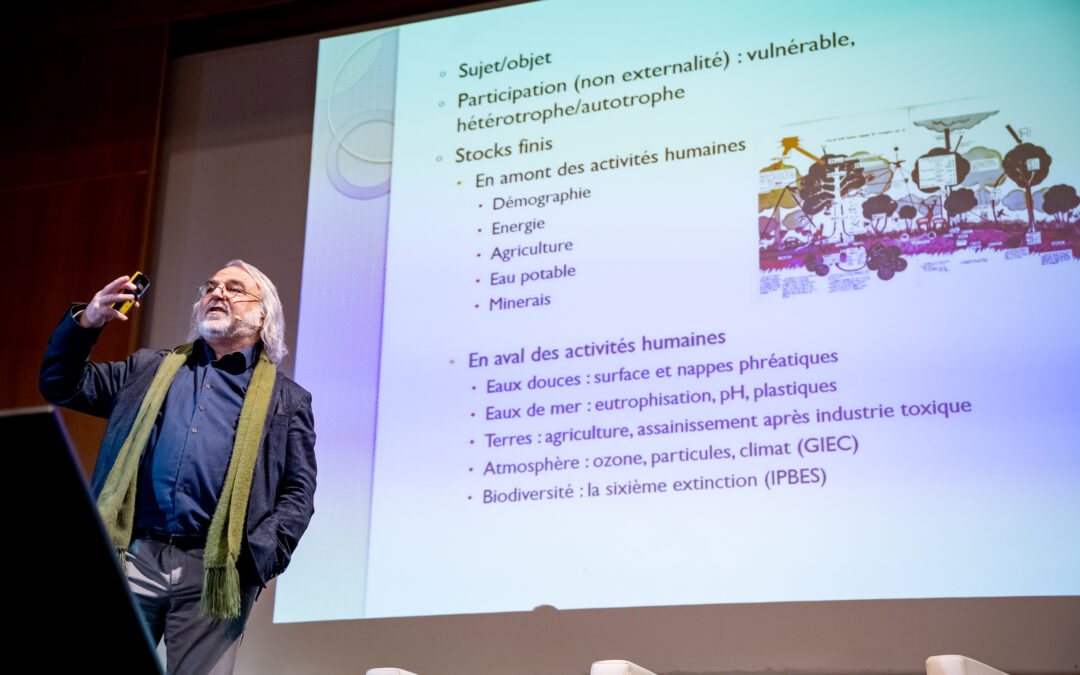- The first International Ecoislas Forum opened its afternoon session with a talk by Bernard Feltz, philosopher, biologist and professor emeritus at the Catholic University of Leuven.
- The event will continue tomorrow, Friday, with a plenary session led by Leen Gorissen and Cristian Felber, along with a number of other parallel sessions.
The inaugural afternoon session of the first International Ecoislas Forum featured a plenary session by Bernard Feltz, philosopher, biologist and professor emeritus at the Catholic University of Leuven, who reviewed history to explain what he defined as “critical modernity” and its relationship with ecology.
“The stock of resources on planet Earth is exhausted,” he warned, explaining that the world now faces “a depleted system”. He reminded us that Western society “was built on the premise that the planet’s resources were infinite”, failing to realise that the Earth “will be unable to sustain an infinite number of people”.
In Feltz’s view, an energy or agriculture minister who deals with energy policies and “does not consider what will happen in three decades is incompetent”. Currently, in terms of minerals, “we are living off the capital we have”, but even if we attempt to recover it “in two generations we wouldn’t reach 50%”. For Feltz, with this way of managing resources “we are mortgaging the lives of future generations”, in what he describes as “a crazy system” where each year “millions of tonnes of plastic are produced and we still don’t know what to do with them”.
As he explained during his presentation, to understand how the planet reached this critical point, we must go back several centuries, since the damage suffered for so long “was so extensive that it interfered with the planet and changed everything”. According to the emeritus professor, the planet is experiencing an “ecological crisis”, which makes sense because it goes “beyond the relationship with nature and has different contexts, in an ethics that draws on history”. He also argues, that now it “must learn to live in a critical modernity while maintaining cultural diversity, and taking scientific ecology seriously”.
Bernard Feltz’s plenary session opened an afternoon of parallel sessions and working groups that focused on the four main pillars for real and successful change: the circular and blue economy; energy, water and mobility; climate change adaptation; and regenerative tourism.
Data: the Key to Sustainable Mobility
In the field of energy, water and mobility, sustainable mobility activist and urban cyclist, Mónica Palacios; Sagulpa’s manager, José Ricart; and the Climate Alliance’s CITY CYCLING Project Manager, André Muno, had the opportunity to discuss sustainable mobility on the islands, a crucial issue that, as José Ricart explained, “must draw on experience and data for better and greater knowledge and thus create policies and services adapted to each need”. In this session, held in the Roque Bentayga Room, he explained the importance of a database to understand “how we move in a limited space” such as an island.
In this regard, he presented Sagulpa’s Big Data project, which, after more than two years of work, has created a platform with data “to make it available to public entities and citizens”. With these data we can “learn about the type of vehicles used, which areas are busiest, the distribution and who is moving in order to see what services the population needs”. In a typical space zoning matrix under study, this project has detected that in 2019 alone, there were 3.2 billion movements to and from Las Palmas de Gran Canaria. These figures highlight the need to provide an efficient management of mobility.
Meanwhile, the parallel session on good practices in circular economy on islands took place. According to circular economy expert Ana Fernández, from Greening The Islands, it must be approached from a polyhedral point of view, and by identifying technical and biological materials. “The circular economy seeks to regenerate nature, even more so on islands that have little space and pollution due to tourism”. This challenge of “regenerating the system” requires studying and separating what the Earth can absorb and what it cannot, in a model that can be spearheaded by islands.
The first International Ecoislas Forum will feature over 60 speakers from academic, administrative, financial, business, and social sectors throughout its two days. The programme is set to continue tomorrow, Friday, at 9 a.m. with the plenary session by Leen Gorissen, a biologist specialising in ecology, regenerative design, and bio-inspired innovation, and founder of Centre4NI. This session will be the first of many others, as the day will also feature Christian Felber, the proponent of the Common Good Economy, and many other parallel sessions.

